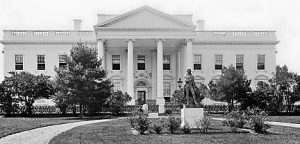
Previously in the novel: War Secretary Stanton holds the Lincolns captive under guard in the White House basement. Stanton selects Duff, an AWOL convict,to impersonate Lincoln. Duff forms his own opinions about cabinet members.
As the Cabinet members left, Welles turned to Duff.
“Mr. President, would you walk with me to the gate?”
“No,” Stanton interjected. “He’s much too preoccupied.”
“I’m not preoccupied at all.”
“Good,” Welles replied, taking Duff by the crook of his arm and leading him down the hall. “How’s Mrs. Lincoln after her carriage accident?”
“Very well,” Duff said, ignoring the exasperated grunts from Stanton behind them. “Doctors at the Soldiers’ Home said her head injuries were minor. It’ll be good for her to recuperate in the cool Maryland foothills.”
“Yes, it can be quite sweltering in Washington during the summer months.”
They began down the grand staircase.
“You know, Mrs. Welles always inquires about Mrs. Lincoln. She’s quite fond of her. Often she has protested the unfair attacks on her in the newspapers.”
When they reached the foyer, Welles gave a wary glance up the stairs and then at the front door guard, John Parker, who was already red in the face from drinking.
“Good morning, Mr. Parker,” Duff said. “I’m escorting Mr. Welles to the gate. I won’t be long.”
“Very well, sir.” Parker’s voice was thick with whiskey.
As they walked down the steps, Welles leaned into Duff.
“I wanted a private word with you, Mr. President,” Welles said in a hushed voice. “It seems Mr. Stanton has been omnipresent the last few months.”
“Really? I hadn’t noticed.” Duff raised an ingenuous eyebrow.
“Mr. President, I wish I had your gentle wit.” Welles chuckled and shook his bewigged head.
They took a sharp turn to stroll through the garden to the turnstile gate.
“What’s on your mind, Mr. Secretary?”
“I was less than forthcoming during the Cabinet meeting,” he whispered. He stopped to examine a rose bush. “I wish I still had my sense of smell. Roses have a marvelous bouquet.” Again Welles looked up, this time at the second-story window, where Stanton stood glaring at them.
“I assume you weren’t forthcoming because of Mr. Stanton.”
“I don’t trust him.” Welles straightened and looked at Duff. “He exudes the aura of frustrated ambition. Put quite bluntly, Mr. President, he covets your job.”
“So do Mr. Chase and Mr. Seward.”
“But not as much as Mr. Stanton.”
“So what do you want to tell me?”
“I’ve my sources at Gettysburg,” he whispered as he gripped the top of the turnstile gate. “On both sides. I don’t want Mr. Stanton to know.”
“What is it?”
“On the Confederate side, my sources say General Lee isn’t well.”
“I’m sorry to hear that.”
“It’s his heart,” Welles said, leaning into Duff. “His appearance indicated a heart attack. If that’s so, his judgment’s impaired. He’ll make mistakes. His decision to attack Little Round Top was disastrous. There’s no question his decision to charge the center of the Union line today will be an unequivocal failure.”
“So that’s good for us, correct?”
“Not necessarily. My sources on our side tell me General Meade errs on the side of caution to the extent he won’t pursue Lee when he retreats.”
“That wouldn’t be good.”
“Your understatement is amusing,” Welles said wryly. “You—we—will need a replacement for General Meade.”
“Of course.”
“Before Mr. Stanton makes his suggestion, I’d like to recommend General Grant.”
“But he’s mired in the Mississippi mud outside Vicksburg,” Duff said. “And my sources tell me he’s disappeared in the bottle.”
“My sources,” Welles said, shaking his head, “which I assure you are faster and more accurate, say Mrs. Grant arrived in camp, and the drinking stopped.” His mouth went close to Duff’s ear. “They also say he’s close to a great victory. Vicksburg’s capitulation may come as soon as tomorrow.”
“Thank you for your information,” Duff said, glancing over his shoulder to the second-story window, where Stanton still glared down upon them. “I’ll consider your recommendation of General Grant most seriously—as I’ll consider nominations from other Cabinet members.”
“Don’t let Stanton sway you.” Welles grabbed Duff’s arm. “He’s one of that breed who believes it’s impossible that he could be wrong, therefore any action he takes is justified.”
“We all, at one time or another, have to fight such delusions,” Duff said with a slight smile.
“If, sir, you’re implying I’m suffering from that delusion,” Welles said, pulling away from Duff, “you’re wrong.”
Deciding to allow prudence to prevail, Duff nodded and extended his hand. A moment passed before Welles took it. He turned abruptly, went through the turnstile, and walked down the path to the War Department.
Lincoln in the Basement Chapter Fifty-Four
Leave a reply